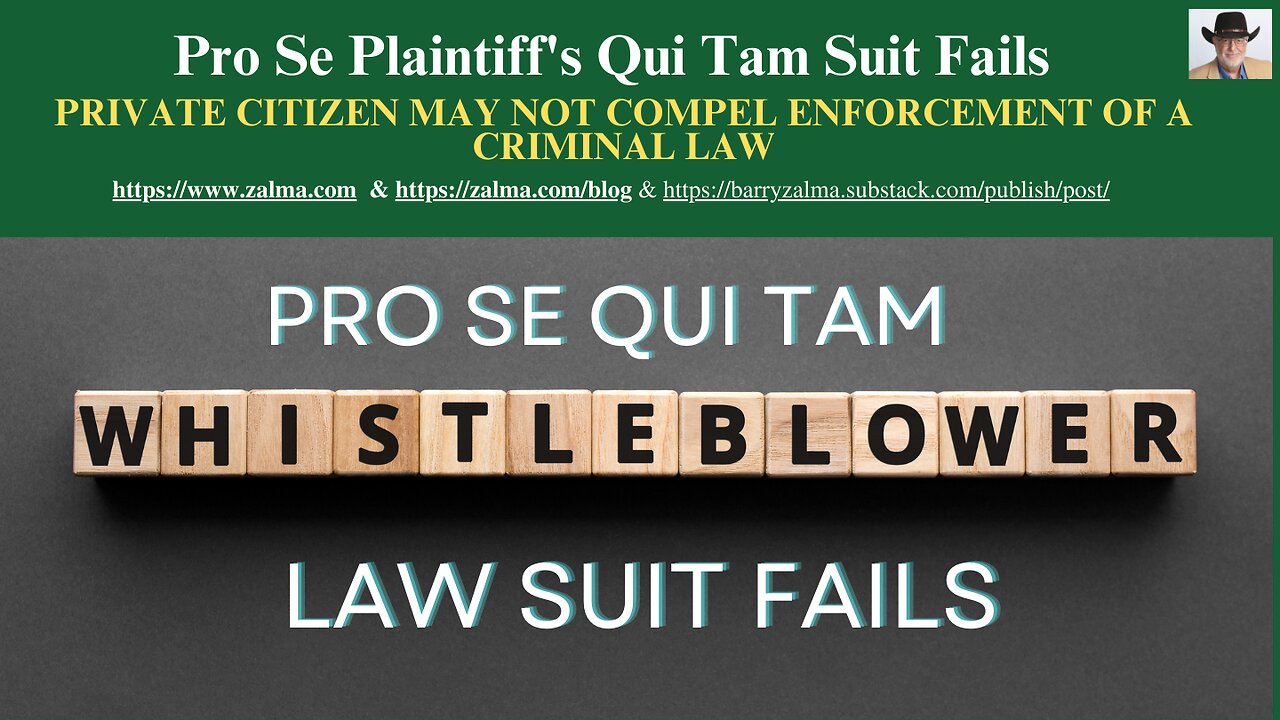Premium Only Content

Pro Se Plaintiff's Qui Tam Suit Fails
Private Citizen May Not Compel Enforcement of a Criminal Law
Post 4774
Ronald Rothman appealed from an order of the District Court dismissing his complaint with prejudice and remanding a foreclosure proceeding to state court.
In Ronald S. Rothman v. CABANA SERIES IV TRUST; IGLOO SERIES IV TRUST; U.S. BANK TRUST NATIONAL ASSOCIATION, as Trustee; WELLS FARGO BANK, N.A.; BALBEC CAPITAL, L.P.; SN SERVICING CORPORATION; FRIEDMAN VARTOLO, LLP; QUENTEN GILLIAM, ESQ., No. 23-2455, United States Court of Appeals, Third Circuit (April 2, 2024)
FACTS
In June 2023, Rothman sued the defendants alleging that defendants violated federal civil and criminal laws in connection with an "invalid mortgage loan." Rothman claimed that the loan was obtained by his son in 2006 to finance the purchase of a property from Rothman, that the "Notice of Settlement" for the loan was improperly recorded, and that the defendants illegally collected (or benefitted from) insurance payments on the "invalid" loan. The action was based on the False Claims Act and numerous criminal statutes, including the RICO Act. Rothman sought "declaratory judgments," nullifying the mortgage loan and the sale of the property, and requiring restitution of the insurance payments.
In July 2023, Rothman filed a letter with the District Court, seeking to remove a 2022 foreclosure action (which stemmed from an alleged default of the mortgage loan) from the New Jersey Superior Court, Chancery Division, to the District Court. In a Memorandum Order entered July 31, 2023, the District Court granted Rothman's motion to proceed in forma pauperis, and screened and dismissed the complaint with prejudice pursuant to 28 U.S.C. § 1915(e)(2)(B).
JURISDICTION
Appellees contend the Third Circuit lacked jurisdiction to review the order remanding the foreclosure matter. The complaint was not a notice of removal but rather an original action, and the District Court appropriately treated it as such.
In its Memorandum Order, the District Court considered the claims and dismissed them. That determination was final. It is reviewable by the Third Circuit. A district court cannot prevent appellate review of a final order by contemporaneously remanding a case to state court.
THE COMPLAINT
The complaint sought to hold defendants civilly and criminally liable for insurance fraud. Rothman claimed that the suit was "in the [p]ublic [i]nterest" because the defendants were depriving the "American [p]ublic and [c]itizens" of the federal funds.
The Third Circuit agreed with the District Court that Rothman, in essence, asserted a False Claims "qui tam" suit. In such cases, the Government is the real party in interest. Although a private person (the relator) may bring the suit on behalf of the Government circuit courts agree that a pro se litigant, like Rothman, may not. Nor could Rothman, as a private citizen, compel enforcement of criminal law. The District Court properly dismissed the complaint.
ZALMA OPINION
Qui tam suits are a powerful tool against insurance fraud. However, as the Third Circuit made clear, a private citizen acting in pro se may not nor may a private citizen compel enforcement of criminal law. The case established the old saying that "he who represents himself has a fool for a client."
(c) 2024 Barry Zalma & ClaimSchool, Inc.
Please tell your friends and colleagues about this blog and the videos and let them subscribe to the blog and the videos.
Subscribe to my substack at https://barryzalma.substack.com/publish/post/107007808
Go to X @bzalma; Go to Newsbreak.com https://www.newsbreak.com/@c/1653419?s=01; Go to Barry Zalma videos at Rumble.com at https://rumble.com/c/c-262921; Go to Barry Zalma on YouTube- https://www.youtube.com/channel/UCysiZklEtxZsSF9DfC0Expg.
Go to the Insurance Claims Library – https://lnkd.in/gwEYk.
-
 9:26:16
9:26:16
Dr Disrespect
10 hours ago🔴LIVE - DR DISRESPECT - WARZONE - PR ATTEMPTS
57.7K26 -
 LIVE
LIVE
Akademiks
1 hour agoDay 1/30. Lebron checks stephen a Smith. TOry Lanez talking CRAZY asf. Lil Ronnie K*Ilers Caught
2,955 watching -
 LIVE
LIVE
FreshandFit
2 hours agoCall-In Show
2,692 watching -
 4:27:46
4:27:46
Nerdrotic
6 hours ago $31.93 earnedDaredevil Born Again REVIEW, Harry Potter Show DOA, DC HACKED! | Friday Night Tights 344 Paul Chato
83.1K27 -
 1:15:15
1:15:15
Glenn Greenwald
3 hours agoWeek in Review: Lee Fang and Leighton Woodhouse on Ukraine War and NYT Piece Revealing Tensions within Trump Admin; PLUS: Lee Fang Takes Audience Questions on DOGE and Big Tech | SYSTEM UPDATE #420
41K30 -
 1:03:30
1:03:30
Sarah Westall
5 hours agoMassive Government Overhaul: FBI, CIA, IRS and more to be Gutted w/ Sam Anthony
24.5K13 -

IsaacButterfield
5 hours ago $1.35 earnedAustralia Under Attack | Trump's State of the Union | All LGBTQ Cast (W Guest Frenchy)
17.6K -
 1:23:37
1:23:37
Edge of Wonder
5 hours agoIs Your Car Collecting Your Biodata? Whistleblower Exposes Dark Agenda
21.5K2 -

Quite Frankly
8 hours ago"News Round-Up, Celebrity Stories, Friday Extras" ft. J Gulinello 3/7/25
27.9K5 -
 55:49
55:49
LFA TV
1 day agoGermany Started Two World Wars and Now Wants Nuclear Weapons | TRUMPET DAILY 3.7.25 7PM
26.8K20